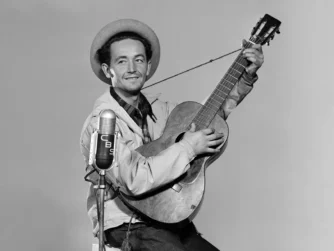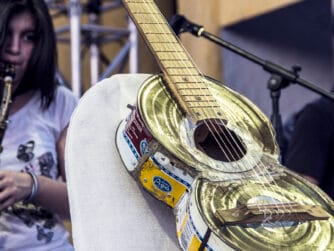Voice 1
Welcome to Spotlight. I’m Colin Lowther.
Voice 2
And I’m Megan Nollet. Spotlight uses a special English method of broadcasting. It is easier for people to understand, no matter where in the world they live.
Click here to follow along with this program on YouTube.
Voice 1
No one expected Adolphe Sax to live past childhood. The little boy seemed to tempt bad luck. When he was three years old, he fell down three flights of steps. He hit his head on the stone floor and did not wake for a week. When he was ten, he fell into a river and nearly drowned. Once, a large stone fell from the top of a house. Again, he lost consciousness. He did not wake up for a day. He experienced so many deadly accidents that his neighbors called him “little sax, the ghost.”
Voice 2
But Adolphe Sax did live. And, in the time that he was not recovering from his accidents, he was learning. He worked in his father’s instrument-making shop. He was experimenting with new ways of making music. And soon he would create one of the most interesting instruments of the modern age, the saxophone.
Voice 1
Today’s Spotlight is on the Strange Life of Adolphe Sax.
Voice 2
Adolphe Sax was born in 1814 in Belgium. His father and mother were instrument makers. And they raised young Sax in the trade. Sax may have been likely to get into accidents. But he was very good at working with instruments. His parents taught him how to make many instruments. But Sax loved working on wind instruments, which musicians play by blowing air through them. Jo Santy was a researcher at the Museum of Musical Instruments in Brussels, Belgium. He spoke to the Public Radio Exchange about Sax’s early life:
Voice 3
“Little Adolphe had the time to learn all about making instruments in this workshop. And he was really great at it. He started out on his own instrument, the clarinet, when he was fourteen or fifteen years old. He improved the instrument. He changed the inside of the instrument. And he changed the exact placement of the holes. It made it sound better.
Voice 1
By the time that he was twenty-eight, Adolphe Sax had already won many awards from his government. People all over Europe recognized him as one of the most gifted instrument makers of his time.
Voice 2
But Sax had a lot of energy. He was not content with making instruments that others had invented before him. He wanted to change the way people made music. So he began work on his own instrument, the saxophone.
Voice 1
Sax invented the saxophone because of a problem he saw in the way people made music. In those days, a lot of musicians would play in orchestras. This large group of musicians usually had three kinds of instruments. These were stringed instruments, woodwind instruments, and brass instruments. Stringed instruments are made of wood. People play them by pulling a bow across strings. They sound very expressive. But they are not very loud. Woodwind instruments, like flutes, are louder. But brass instruments, like horns, are even louder. Because of this, orchestras are not balanced. One part of the orchestra can make it difficult to hear the others.
Voice 2
Sax hoped the saxophone would solve this problem. The new instrument would play like a wind instrument. But, like most brass instruments, it would be made from metal. This would give the instrument the sound of a woodwind, but it could be as loud as a brass instrument. And it could be as expressive as a string instrument. Sax believed this new instrument could solve the problems he found in orchestras. He even thought that one day saxophones would replace other wind instruments. He even invented different kinds of saxophones for this reason.
Voice 1
In 1842, Sax moved to Paris. This was the center of Europe’s instrument making world. And Paris had some of the continent’s most important composers, people who write music. Sax hoped that here his work would be influential. He also hoped that his work would make him a good deal of money.
Voice 2
For a while, Sax’s risk worked. Most orchestras did not take on the saxophone. But he persuaded the French military to use his instruments, including the saxophone. He made friends with many important composers. One of these composers was named Hector Berlioz. He was one of the first people to write music for the saxophone. He wrote about the instrument in one Paris newspaper.
Voice 4
“The sound quality of the saxophone has something strange and sad about it in its high notes. The low notes, on the other hand, are of a great nature. One might even say they are amazing. For works that are mysterious or serious, the saxophone is the most beautiful low voice known to this day.”
Voice 1
For several years, Sax was very successful. He created many special, creative instruments. He improved older instruments. And he was, for a while, the only person making saxophones. By the 1850s he was one of Paris’ most well-known musical names.
Voice 2
But Sax’s success did not last. He had created something original. But people were slow to understand it. Some musicians found his instrument too strange to work with. Composers did not know how to fit it into their music. Many did not take it seriously. And Sax’s competitors also made sure it stayed that way. Other instrument makers formed organizations to compete with him. They wrote negative things about him in newspapers. They stole his ideas. Twice, they even tried to have him killed!
Voice 1
But Sax also hurt his own business. He had a difficult personality. He could be extremely stubborn, or willful. He would take people to court who made instruments that were like saxophones. And he would do it often. Legal action cost him a lot of money. And it made no money in return. He often found himself in financial trouble. His business lost all its money three times. He died in 1894 with very little money.
Voice 2
Still, Adolphe Sax’s name lives on. In the years since he died, the saxophone has become one of the most popular instruments in the world. It is important to the history of blues music. It is even more important in jazz. It never truly became popular in orchestras. But its unique sound helped create new, more popular kinds of music. Some hate it. Some love it. But today it is difficult to deny the power of Adolphe Sax’s greatest creation.
Voice 1
What kind of music do you like? Does it include the saxophone? You can leave a comment on our website. Or email us at radio@spotlightenglish.com. You can leave a comment on our website at www.spotlightenglish.com. You can also find us on YouTube, Facebook, TikTok, Instagram and X. You can also get our programs delivered directly to your Android or Apple device through our free official Spotlight English app.
Voice 2
The writer of this program was Dan Christmann. The producer was Michio Ozaki. The voices you heard were from the United Kingdom and the United States. All quotes were adapted for this program and voiced by Spotlight. No A.I., or artificial intelligence, was used in this program. Spotlight programs are written, voiced, and produced BY real people FOR real people, no matter where in the world you live. This program is called, “The Strange Life of Adolfe Sax.”
Voice 1
We hope you can join us again for the next Spotlight program. Goodbye.
Question:
What kind of music do you like? Does it include the saxophone?








Its sow pwerfull spotlight to every one he want to learn english thank you ❤️and keep. It
You are welcome. Thank you for your comment.
Good
Yes, I like saxophone sounds and music that include this wind instrument. I enjoy so much this podcast, specially because I am trying to learn how to play an alto sax I got, but also to learn English at the same time.